|
|
|
Sort Order |
|
|
|
Items / Page
|
|
|
|
|
|
|
| Srl | Item |
| 1 |
ID:
174152
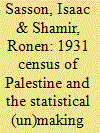

|
|
|
|
|
| Summary/Abstract |
This study sits at the intersection of census-making, colonialism, and the politics of statistical expertise. It considers the Palestine Census that the country’s British rulers had undertaken in 1931. It focuses on British intentions to include questions that could have yielded data about the alleged emergence of an Arab ‘landless class’. The validation of such a category would have justified British restrictions on Jewish immigration to Palestine. We trace the trajectory of ‘landlessness’ as a statistical category. We show that disparity in statistical expertise between Arab and Jewish experts, and a parity between Jewish and British experts, played a decisive role in shaping the census schedule. Consequently, Arab landlessness failed to become a valid statistical category. Our case highlights British census-making in India as a broad colonial model to be applied in other colonies and to be used as a scientific justification for Britain’s various political agendas.
|
|
|
|
|
|
|
|
|
|
|
|
|
|
|
|
| 2 |
ID:
174149
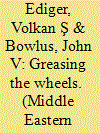

|
|
|
|
|
| Summary/Abstract |
In the 1880s, Germany cultivated an alliance with the Ottoman Empire that led to a concession to build one of history’s most storied, diplomatically contentious, and financially challenging infrastructure projects: the Berlin-Baghdad Railroad. While Germany had many goals in pursuing the project, oil was the only way to make the railroad economic. Drawing on Ottoman archival sources, this article examines the policies and strategies of Sultan Abdülhamid II in relation to Germany’s attempt to develop Mesopotamian oil from German Emperor Wilhelm II’s visit to Istanbul in 1889 to the conclusion of Germany’s oil concession in 1906/7. It argues that Hamid pursued a pragmatic policy to develop and protect Ottoman oil from being dominated by the powers, especially the British Empire, and, in the process, seeks to reorient our understanding of great power interest in Middle East oil.
|
|
|
|
|
|
|
|
|
|
|
|
|
|
|
|
| 3 |
ID:
174148
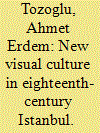

|
|
|
|
|
| Summary/Abstract |
This article examines the construction and expansion of a less-known royal shore kiosk complex in Istanbul, namely the Shore Palace near the Cannon Gate (Topkapısı Sahil Sarayı) or Summer Harem, which was built on the outskirts of the royal palace complex in the eighteenth century, to interpret the changing features of royal residential culture and spatial practices. In this article, I aim to propose a new thematic frame based on the central role of the issue of visuality to examine the shifting cultural paradigm of eighteenth-century royal patronage. The eighteenth century witnessed the physical expansion of the complex and renovation of the furnishings several times and the official records of these activities provide us with invaluable information for the visual construction of these buildings, which were torn down after a devastating fire in 1862. Furthermore, the choice of location and all physical changes in the interiors and gardens demonstrate the spatial results of the changing codes of visual culture in the cityscape. In this respect, examination of this case enables us to discuss how the new visual culture was adopted and exercised in and around the royal palace gardens by the royal court members.
|
|
|
|
|
|
|
|
|
|
|
|
|
|
|
|
| 4 |
ID:
174153
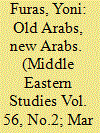

|
|
|
|
|
| Summary/Abstract |
With the expansion of public education, Palestine under the British mandate witnessed the emergence of a local pedagogic discourse and the proliferation of pedagogic literature, led mainly by government employees. This study focuses on the biographies and pedagogic work of these Palestinian educators. Specifically, it analyses authorship of educators who were employed by the colonial Department of Education, a system that offered ambiguous objectives for the Arab population. It locates the new Arab, a knowledgeable, modern citizen of the world, yet one who is firmly tied to his national roots and cultural heritage, as the embodiment of the educational vision. Through textbooks, school journals and archival documents, the study shows the complex forms in which nationalism, authenticity and modernism were articulated in pedagogic literature. It argues that the acquisition of knowledge was perceived as the key for personal and collective emancipation, and investigates the mechanisms through which historical, geographic and religious knowledge were created, adapted and translated in order to serve this educational goal. Furthermore, it underlines the role of the Zionist settler colonial project in the construction of the new Arab’s image, therefore making Palestinian pedagogy a unique test case in the region’s scholarship on interwar education.
|
|
|
|
|
|
|
|
|
|
|
|
|
|
|
|
| 5 |
ID:
174155
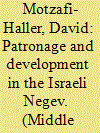

|
|
|
|
|
| Summary/Abstract |
The article focuses on the early stages of the colonization of the Israeli Negev during the 1950s. It reconstructs the early stages of the settlement of Yeruham from the perspective of one local administrator, Shlomo Tamir, who managed the settlement for a one-year period, 1952–1953. Conceptualizing Tamir’s role as that of a mediator, it draws attention to the forming political structure of patronage and clientelism on the local level and the concomitant changes in the ‘big-man’ networks of pre-state elite networks as they expanded into Israel’s southern frontier. A micro historical analysis focused on Tamir’s deputies furnishes a discussion on the social make-up of the Israeli frontier, comprising of a typical frontier mixture of fortune seekers, opportunity hunters, semi-indentured laborers and upwardly mobile colonists.
|
|
|
|
|
|
|
|
|
|
|
|
|
|
|
|
| 6 |
ID:
174156


|
|
|
|
|
| Summary/Abstract |
This article provides an analysis of US-Lebanese relations and it concentrates on the US intervention in Lebanon in the late 1950s and again in the early 1980s. It makes the following arguments: (a). despite its role as a shelter-providing country the US had little regard for Lebanon’s security or economic welfare. Its policy was on most occasions based on considerations, which usually affected the entire Middle East region and not only Lebanon. (b). The US government never considered nor discussed the need to perpetuate Christian rule in Lebanon. Its spokesmen have often made statements which were misinterpreted by the Lebanese, particularly the Maronites among them who believed that they were nothing less than commitments to guarantee that they remain at the helm. (c.) Despite the impression that one obtains from the cordial statements made by both sides the bilateral ties had been often marred by numerous occasions of tension and discontent. (d). Lebanon’s quest for a shelter-providing power entailed major sacrifices and concessions that its leaders had to make in order to continue receiving the benefits which the US could provide.
|
|
|
|
|
|
|
|
|
|
|
|
|
|
|
|
| 7 |
ID:
174154
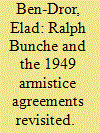

|
|
|
|
|
| Summary/Abstract |
The African American UN mediator Ralph Bunche ended the 1948 Arab-Israeli war by getting the combatants to sign armistice agreements. Awarded the Nobel Peace Prize in 1950, Bunche became an international hero, acclaimed as the outstanding mediator of the Arab-Israeli conflict. This impression emerged almost immediately; everything written over the years corroborated it. But studies published after the turn of the century propagated a different view of Bunche as a weak mediator, manipulated by the Israelis and Americans. The present article, drawing on materials from archives and other sources (some of them available only in Hebrew), including new knowledge about Israeli plans for military operations while the talks were in progress (most of them remained on paper), casts a different light on those months. Analysing Bunche’s role in the negotiations (principally with Egypt and with Jordan), it shows that he ran the talks objectively and skilfully and prevented a renewal of the fighting – which would have resulted in an overwhelming Israeli victory, at the expense of the Arab countries and Palestinians.
|
|
|
|
|
|
|
|
|
|
|
|
|
|
|
|
| 8 |
ID:
174150


|
|
|
|
|
| Summary/Abstract |
In the early 1920s, Turkey hosted thousands Russian refugees, commonly known as White Russians, who fled from the Bolshevik regime and the Russian Civil War (1918–1922). Although most of these refugees continued their journeys towards Western Europe or North America, some of them opted to stay in Turkey and tried to integrate to the new republican regime that was established in 1923. This article examines the conditions in which refugees were given or denied Turkish citizenship to understand how inclusive the citizenship regime was in the interwar period. The temporal framework of the article spans from 1923 to the outbreak of the Second World War. This research suggests that most Russian refugees who became Turkish citizens throughout the 1920s and 1930s converted to Islam. This tendency proves the importance of religion in defining citizenship, despite the proclaimed secularity of the new regime.
|
|
|
|
|
|
|
|
|
|
|
|
|
|
|
|
| 9 |
ID:
174151
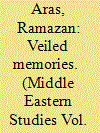

|
|
|
|
|
| Summary/Abstract |
Under the omnipresence of surveillance, control and fear of the state as ontological signifiers, not only agency but also subjective and collective memories of people become unspeakable, hidden and veiled. This paper aims to underline the difficulties of doing ethnographic research on the secular Turkish state formation and its diverse apparatuses with a particular focus on the single-party regime that started in 1923 and ended in 1950. This work claims that fear of the state, inaccessibility of the state archives, the inscription of protective laws such as lèse-majesté for founding figures of the state, and the senility of survivors result in muteness, the emergence of politics of forgetting and remembering that diminish the possibility of studying relations between the authoritarian secular state and its Muslim subjects. It is argued that the hegemony of emotions of fear of the state and insecurity have turned historical and ethnographic research on the subject matter into a difficult one. Based on a recently conducted large-scale oral history study in different parts of Turkey, this paper also analyzes the resistance, resilience, and silence of mass Muslim population towards diverse forms of state-sponsored authoritarian secular politics along with western and Turkish nationalist top-down regulations of the new regime.
|
|
|
|
|
|
|
|
|
|
|
|
|
|
|
|
|
|
|
|
|